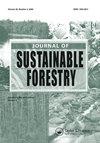Forest-Based Ecotourism in Sri Lanka: A Review on State of Governance, Livelihoods, and Forest Conservation Outcomes
IF 1.8
4区 农林科学
Q3 FORESTRY
引用次数: 15
Abstract
ABSTRACT Forest-based ecotourism in global perspective is managed by various stakeholders while promoting sustainable forest management. This review article attempts to identify forest-based ecotourism destinations in Sri Lanka, analyze the experiences of good governance, and evaluate local livelihoods and forest conservation outcomes. Within the diverse landscapes, national park and sanctuaries, rain forest trails, conservation forest trials, wetland sanctuaries, and indigenous operated ecotourism ventures are identified as the appropriate destinations. The experiences of good governance are discussed in terms of structure and integration, involvement and management, accountability practices, and culture of transparency. The enrichment of the local livelihoods is evaluated based on natural, physical, social, financial, and human capital development. The natural resource conservation activities prevention of deforestation and forest degradation, preservation of biological diversity, improvement of long-term production capacity of ecosystems, and wise management of natural resources are elaborated through local community outcomes, visitor outcomes, natural biophysical environment outcomes, wildlife outcomes, and organizational outcomes. Resource exploitation, gene piracy, wildlife crimes, and trade of protected flora and fauna have been examined as the bad side of the ecotourism. The policies suggested for sustainable development are conceptualization of ecotourism, community-based ecotourism, scientific and systematic process, and appropriate code of ethics and conduct.斯里兰卡的森林生态旅游:治理状况、生计和森林保护成果综述
全球视野下的森林生态旅游是在促进森林可持续管理的同时,由各利益相关者共同管理的。这篇综述文章试图确定斯里兰卡以森林为基础的生态旅游目的地,分析良好治理的经验,并评估当地生计和森林保护成果。在不同的景观中,国家公园和保护区、雨林小径、保护森林试验、湿地保护区和土著经营的生态旅游企业被确定为适当的目的地。从结构和整合、参与和管理、问责做法和透明文化等方面讨论了善治的经验。当地生计的丰富性是根据自然、物质、社会、金融和人力资本发展来评估的。自然资源保护活动通过当地社区成果、游客成果、自然生物物理环境成果、野生动物成果和组织成果,阐述了防止森林砍伐和森林退化、保护生物多样性、提高生态系统长期生产能力和自然资源的明智管理。资源开发、基因盗版、野生动物犯罪和保护动植物贸易被认为是生态旅游的弊端。可持续发展的政策建议是生态旅游的概念化,社区生态旅游,科学和系统的过程,以及适当的道德和行为准则。
本文章由计算机程序翻译,如有差异,请以英文原文为准。
求助全文
约1分钟内获得全文
求助全文
来源期刊

Journal of Sustainable Forestry
Social Sciences-Geography, Planning and Development
CiteScore
3.90
自引率
12.50%
发文量
42
期刊介绍:
Journal of Sustainable Forestry publishes peer-reviewed, original research on forest science. While the emphasis is on sustainable use of forest products and services, the journal covers a wide range of topics from the underlying biology and ecology of forests to the social, economic and policy aspects of forestry. Short communications and review papers that provide a clear theoretical, conceptual or methodological contribution to the existing literature are also included in the journal.
Common topics covered in the Journal of Sustainable Forestry include:
• Ecology, management, recreation, restoration and silvicultural systems of all forest types, including urban forests
• All aspects of forest biology, including ecophysiology, entomology, pathology, genetics, tree breeding, and biotechnology
• Wood properties, forest biomass, bioenergy, and carbon sequestration
• Simulation modeling, inventory, quantitative methods, and remote sensing
• Environmental pollution, fire and climate change impacts, and adaptation and mitigation in forests
• Forest engineering, economics, human dimensions, natural resource policy, and planning
Journal of Sustainable Forestry provides an international forum for dialogue between research scientists, forest managers, economists and policy and decision makers who share the common vision of the sustainable use of natural resources.
 求助内容:
求助内容: 应助结果提醒方式:
应助结果提醒方式:


